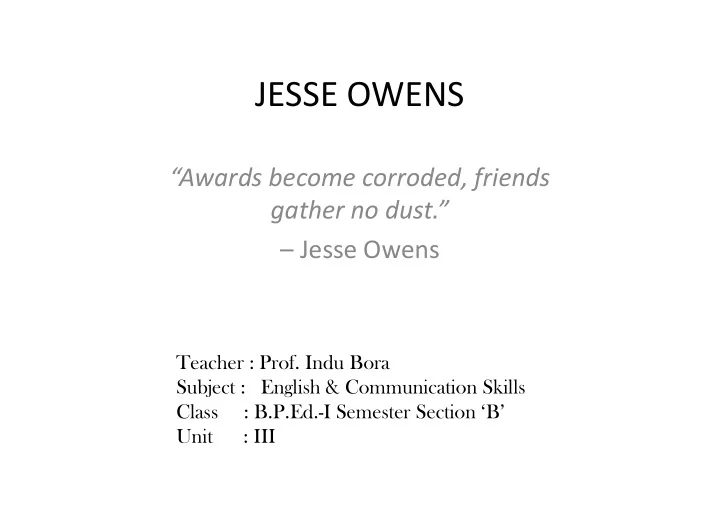

JESSE OWENS “Awards become corroded, friends gather no dust.” – Jesse Owens – Jesse Owens Teacher : Prof. Indu Bora Subject : English & Communication Skills Class : B.P.Ed.-I Semester Section ‘B’ Unit : III
JESSE OWENS JAMES CLEAVELAND OWENS
Early Years • The son of a sharecropper and the grandson of slaves. • Born on September 12, 1913 in Danville, Alabama. • A frail child, Owens was often sick . Suffered from chronic bronchial congestion and pneumonia. • At the age of seven he picked up to 100 pounds of cotton a • At the age of seven he picked up to 100 pounds of cotton a day. • At age nine Owens moved with his family to Cleveland • Bigger school & strict teachers • Owens earned the nickname Jesse when one of his instructors, unable to decipher his thick southern accent, believed he said his name was Jesse instead of J.C.
Rising Star • At East Technical High School - a nationally recognized sprinter, setting records in 100 ,200-yard dashes and long jump. • After graduating, Owens enrolled at Ohio State University where he continued to flourish as an athlete. where he continued to flourish as an athlete. • Known as "Buckeye Bullet,“ • In 1935 Big Ten Championships, he overcame a severe tailbone injury and created world record in 100 , 220-yard dash , 220-yard low hurdles. • Set a long jump record that stood for 25 years. • Dominated at the Big Ten games that year. • Owens competed in 42 events that year and won them all.
The 1936 Olympic Games • For Adolph Hitler and the Nazis, the 1936 Berlin Olympic Games was expected to be a German showcase and a statement for Aryan supremacy. • African Americans dominated . • In all U.S. won 11 gold medals, six of them by black athletes. • Owens was the most dominant athlete to compete. • Owens was the most dominant athlete to compete. • He captured four gold medals (the 100-meter, the long jump, the 200-meter, and the 400-meter relay race) and broke two Olympic records along the way. • After Owens won the 100-meter event, a furious Hitler stormed out of the stadium.
• Inspite of grand success he did not receive any recognition. • President Franklin D. Roosevelt failed to meet and congratulate Owens. • Properly recognized by President Gerald Ford in1976, who awarded him the Presidential Medal of Freedom. • The mild mannered Owens seemed not the least • The mild mannered Owens seemed not the least bit surprised by his home country's hypocrisy. • " When I came back to my native country, after all the stories about Hitler, I couldn't ride in the front of the bus," he said. "I had to go to the back door. I couldn't live where I wanted. I wasn't invited to shake hands with Hitler, but I wasn't invited to the White House to shake hands with the President, either."
Later Years • After 1936 Olympic Games, Owens retired from amateur athletics and started to earn money from his physical talents. • He raced against cars and horses. • He raced against cars and horses. • Owens gave lectures in conventions and gatherings. • Set up a business for himself in Chicago and travelled frequently around the country giving lectures. • Owens, who smoked up to a pack of cigarettes a day died of lung cancer in Tucson, Arizona on March 31, 1980.
Recommend
More recommend